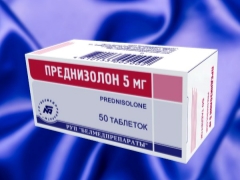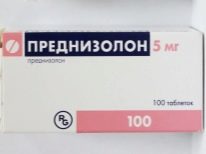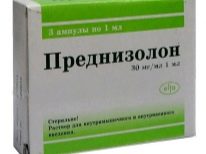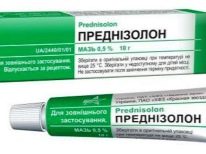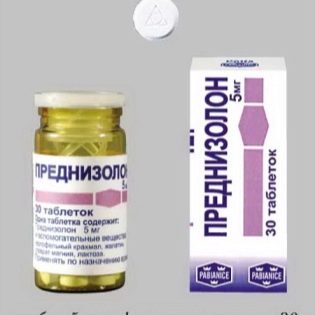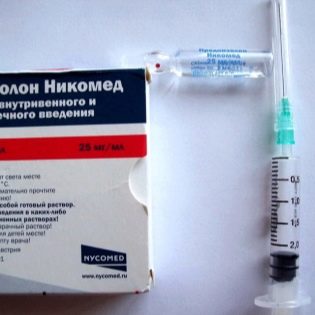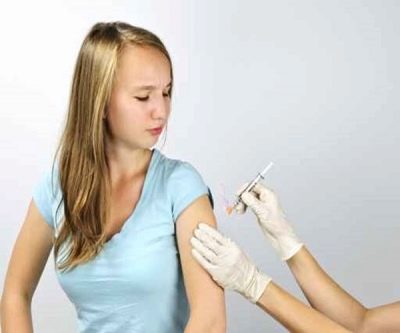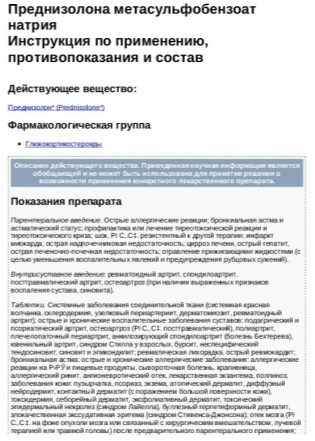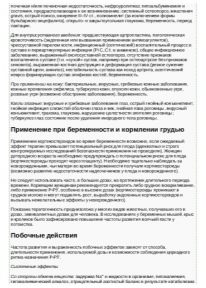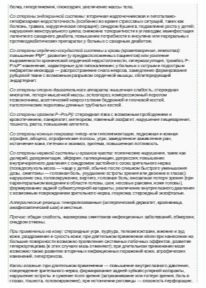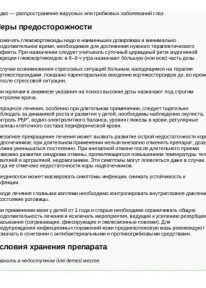Prednisone for children: dosage and instructions for use
Prednisolone is a hormonal medicine that is commonly used in acute diseases and life-threatening conditions. When is it prescribed for children and in what form is it used? How does such a drug work on a child’s body, and what kind of adverse reaction can a child have during the treatment with prednisone?
Release form
Prednisolone is manufactured by several companies, and next to the name of the medication, sometimes there is a word indicating the manufacturer (for example, Prednisone Nycomed). The drug is represented by the following species.
- Pills. Usually they are flat-cylindrical and white in color, and one pack contains from 10 to 120 tablets (most often 100 polymer bottles are produced).
- Ointmentwhich is used for external processing. This is a thick white mass, placed in aluminum tubes in the amount of 10 g or 15 g.
- Solution ampouleswhich can be stabbed into a muscle or injected into a vein. Such ampoules contain 1 or 2 ml of a clear solution. The liquid is colorless, yellowish or yellow-greenish. One pack contains 3, 5 or more ampoules.
In candles, drops, capsules, syrup or other forms of Prednisolone is not released.
Composition
All dosage forms of the drug contain prednisone as the main ingredient. It is presented in such dosages:
- 1 tablet - 1 mg or 5 mg;
- in 1 ml of solution for injection - 15 mg or 30 mg in the form of sodium phosphate;
- 1 gram of ointment - 5 mg.
Excipients in different forms and medicines from different manufacturers differ, so the exact composition should be seen in the instructions or on the packaging of a specific medication.
Operating principle
Prednisolone is a synthetic hormone from the group of glucocorticosteroids and acts similar to hormonal compounds that are produced in the adrenal glands.
This substance:
- Suppresses shock and prevents death in shock;
- quickly and effectively eliminates the inflammatory process, regardless of its severity and localization;
- inhibits exudation - the active release of fluid from inflamed tissues;
- stops the development of an allergic reaction and eliminates allergy symptoms such as rashes, swelling, itching and others;
- stops the active reproduction of cells in the injury site, which prevents the appearance of scars;
- suppresses the immune system.
All these effects of Prednisolone develop very quickly, and the effect of the drug itself is very strong, so it is used in case of danger to life or in cases when other medicines have been ineffective. If there is a possibility of replacing the drug with other drugs, it should be used.
Prednisolone has the following properties:
- stimulation of protein breakdown in tissues and blood flow, as well as the synthesis of protein molecules in liver cells;
- increased blood glucose levels;
- the delay of Na + and water, which causes swelling;
- increased excitability of nerve cells in the brain;
- reduction of potassium absorption in the gastrointestinal tract and stimulation of its removal from the body;
- redistribution of fat reserves with an increase in its amount in the upper part of the body;
- lowering the threshold of convulsive readiness;
- inhibition of glucocorticoid production, as well as FSH and TSH.
Such effects of the drug are not curative, but should be taken into account, since it is they that cause side effects.
Indications
The reason to prescribe Prednisolone tablets and injections is:
- toxic, traumatic, burns or other shocks;
- severe acute allergic reactions (the medication is prescribed for Quinck edema, urticaria and anaphylactic shock);
- swelling of the brain due to various reasons;
- severe bronchial asthma and asthmatic status;
- rheumatoid arthritis, scleroderma and other systemic diseases that affect connective tissue;
- inflammation of the joints of different nature (the drug is injected into the joint or given in tablets);
- acute adrenal dysfunction;
- allergic conjunctivitis;
- uveitis and other inflammatory diseases of the eye;
- agranulocytosis, acute leukemia, thrombocytopenic purpura, hemolytic anemia and other pathologies of the blood system;
- organ transplantation;
- acute hepatitis or hepatic coma;
- thyrotoxic crisis or thyroiditis;
- myeloma;
- sarcoidosis, tuberculosis, aspiration pneumonia and other severe lung diseases;
- poisoning with alkalis and other cauterizing liquids.
Prednisolone ointment is prescribed for eczema, atopic dermatitis, contact dermatitis, toxicdermia, psoriasis and other skin diseases. In addition, this form is prescribed for tendovaginitis, bursitis and keloid scars.
From what age is prescribed?
There are no age restrictions for treating Prednisone with children, but due to the fact that such a drug can negatively affect growth processes in childhood, this hormone is prescribed only if there are serious indications and only under medical supervision.
It is also important not to forget that This tool is used only in acute conditions and always try to appoint a minimum dose for the shortest possible time.
Contraindications
If Prednisolone is prescribed to a child for health reasons, then there is only one contraindication for its use - intolerance to such a medicine. Nevertheless, many diseases require the increased attention of the doctor in the appointment of Prednisolone. Such diseases include various pathologies of the gastrointestinal tract, infections (chickenpox, measles, herpes, tuberculosis, etc.), endocrine diseases, severe liver disease, glaucoma, and so on.
If the child has some serious illness, the question of the use of Prednisolone is solved individually.
Side effects
During treatment with prednisolone, various negative effects can be observed in injections or tablets. eg:
- vomiting or nausea;
- reduced adrenal activity;
- decreased glucose tolerance;
- development of Itsenko-Cushing syndrome;
- change in appetite;
- the development of diabetes mellitus (it is called steroid);
- appearance of erosive esophagitis, bleeding from the wall of the stomach or intestines, as well as steroid ulcers of the gastrointestinal tract;
- growth retardation;
- delayed sexual development;
- violation of the rhythm of heartbeats, increased blood pressure, bradycardia;
- bloating;
- mental disorders, such as depression or paranoia;
- the rise of intracranial or intraocular pressure;
- headaches or insomnia;
- increased sweating;
Side effects
- weight gain;
- eye infection (secondary);
- the appearance of peripheral edema;
- weakness, fatigue, muscle pain and other symptoms of hypokalemia;
- the appearance of strii or acne;
- allergic reactions in the form of a skin rash, itching or other symptoms;
- exacerbation of infectious diseases;
- withdrawal syndrome
The use of ointment can provoke the appearance of "stars", pruritus, excessive dryness, acne, burning and other skin problems.
If a large area of skin is treated with this Prednisolone, the effects of the treatment will be similar to the side effects of injections or taking pills.
Instructions for use
The form of the medicine, the required dosage and the duration of Prednisolone use are determined by the doctor taking into account many factors, including the diagnosis, the patient's condition, the child's age, and his weight in kilograms. Prednisolone for injection can be injected intravenously, either as a jet or through an IV drip (the medicine must be diluted with saline). It is intravenous shots used in acute conditions, when it is required to provide immediate assistance.
If injections into the vein are impossible, the drug is injected intramuscularly, and when the condition is improved, the injections are replaced with tablets. If the drug is prescribed for a long period, it should be canceled gradually, reducing the daily dose. The longer the treatment has been carried out, the slower the drug is withdrawn.
Tablets Prednisolone is most often given once at 6-8 o'clock in the morning, since it is at this time that glucocorticoids are secreted in the human body. If the dosage is very large, it can be divided into several stages. In this morning, the drug is given in a larger dose, and the remaining amount is taken at 12 hours. Prednisolone pills are recommended during meals or immediately after meals. The medicine is washed down with a small volume of liquid.
Prednisolone ointment process the affected areas 1-3 times a day.
The drug should not be covered with a tight bandage and used for more than 14 days.
Prednisolone for inhalation
Like other hormonal drugs (Hydrocortisone, Dexamethasone), Prednisolone can be administered to children in the form of inhalation. Such procedures relieve puffiness, eliminate cramps and cough, and are therefore in demand for laryngeal stenosis, laryngitis or obstructive bronchitis. For manipulations, liquid prednisone is used in ampoules and inhaler.
Calculate the dose of medication, determine the frequency of inhalation and the duration of treatment the physician needs for the particular child.
Overdose
If the dose is too high, blood pressure rises, edemas appear and other side effects increase. In such a situation, it is important to immediately seek medical attention.
Interaction with other drugs
When treating Prednisolone, it is important to consider taking any other medications, since such a hormone is not advised to be combined with many other medications so as not to provoke side effects or intensify them. Among the drugs that should not be used with Prednisolone, note duteriki, cardiac glycosides, phenobarbital, paracetamol, anticoagulants, isoniazid, vitamin D, antacids and other drugs.
In addition, Prednisolone is incompatible with antiviral vaccines, therefore there must be a period between vaccination and glucocorticoid use.
Terms of sale and storage
All dosage forms of Prednisolone are prescription. The price of 100 tablets of 5 mg, depending on the manufacturer, varies from 50 to 115 rubles. One tube of ointment containing 15 g of the drug costs an average of 25-30 rubles.
Store Prednisolone tablets at room temperature, and ampoules and ointment in a cool place. Shelf life, depending on the form, can be 2 years, 3 years or 5 years.
It should be clarified on the packaging of the selected medication and not use the medicine if the date has expired.
Reviews
On the use of Prednisolone in children can meet different reviews. In positive, parents call this medicine effective and note a good effect in case of allergies or inflammation. In negative reviews, mothers usually complain about the frequent occurrence of side effects.
Analogs
If you need to replace Prednisolone, use another drug with the same active ingredient (Medopred, Prednisol) or some other glucocorticoid, for example, medicine based on dexamethasone or budesonide. However, such replacement is permitted only by prescription and under the supervision of a pediatrician.The use of any analogue instead of Prednisolone in the treatment of children without a doctor's appointment is a danger to the health of babies.
Instructions for use of the drug in the next video.
